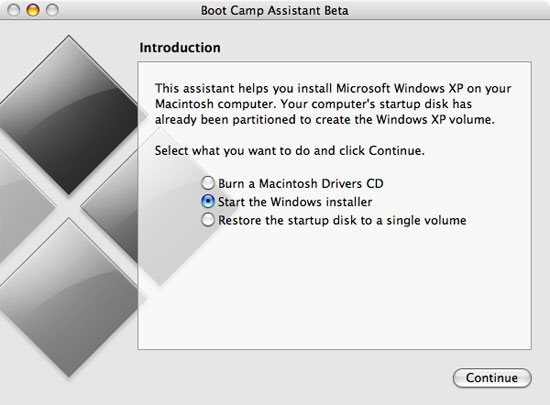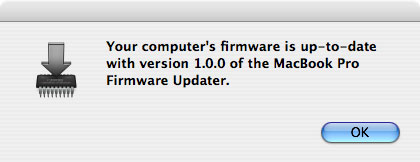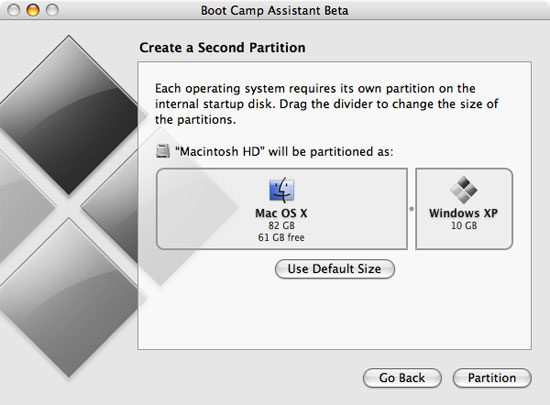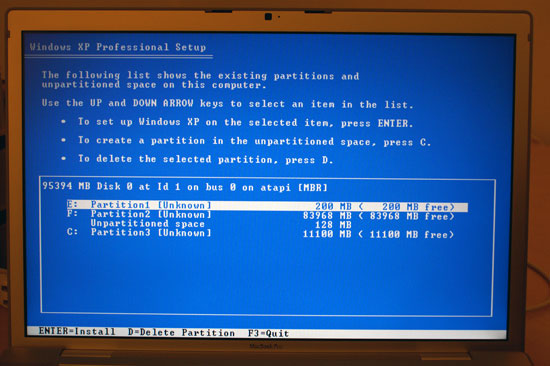Apple's MacBook Pro: Using it as a Mac and a PC
by Anand Lal Shimpi on April 13, 2006 12:00 AM EST- Posted in
- Mac
Apple's Military Aspirations
The slightly redesigned exterior, integrated iSight and performance improvements are more than enough to make the MacBook Pro stand on its own. It's rare that you can make a single upgrade and experience such a noticeable increase in performance, but as I mentioned at the beginning of this article, the MacBook Pro has a couple of features that make it even more enticing.

Apple released the first public beta of Boot Camp, an application that allows you to install Windows XP SP2 on your Intel based Mac. Apple announced that Boot Camp would be shipping with the next version of Mac OS X (10.5), codename Leopard, but until then we've got this free public beta.
The Boot Camp setup process is extremely straightforward, and a lot easier than even I expected it to be. After mounting the Boot Camp image and running the installer I was told that I needed to update my firmware before proceeding with the installation. Given that my MacBook Pro was an earlier revision (Rev C) it didn't have the updated firmware so I had to download and install it before proceeding.
Interestingly enough, the process is different on the MacBook Pro than upgrading firmware was on my PowerBook G4 and PowerMac G5; those two machines simply updated their firmware through OS X's Software Update utility, whereas the MacBook Pro requires you to go out and download the firmware update on your own. I'm not sure if this is because of the switch to Intel or something else entirely.
The firmware update gives you very little feedback or information as to what's going on: you run the program and it shuts down your MacBook Pro. You are then told to hold down the power button until the front power LED starts flashing. Once the front LED starts flashing the firmware update begins and you'll see a grey screen with a progress bar at the bottom of it. When it's done you're greeted with a ridiculously loud beep and then the system reboots and works as normal.

With the firmware updated I ran the Boot Camp assistant once more and now I was ready to begin. The assistant prompted me for a blank CD so it can burn all the drivers I'd need onto that disc. Unfortunately it's impossible for you to get the Boot Camp assistant to run on a non-Intel Mac so your only hope for creating the driver disc is on your MacBook Pro or if you have another Intel based Mac laying around.

After burning the driver CD it's time to start the actual installation process. Boot Camp comes with its own partitioning utility, and it requires a minimum of 6GB set aside for your Windows partition; I chose 10, but you can select whatever you'd like. If you actually plan on using the Windows partition on a regular basis for applications and games you may want to make it even larger (as well as opt for the larger 120GB drive). The repartitioning is non-destructive so your OS X installation, applications and documents are safe. Amazingly enough, the repartitioning only took about 2 minutes.

With the partition created and my Windows XP SP2 disc in the drive, it was time to reboot and start the installation. The Boot Camp assistant warns that you must have a Windows XP SP2 disc (either Home or Professional), a SP1 disc will not work. If all you've got is a SP1 disc then you'll have to create a slipstreamed version with SP2 yourself.
After the reboot I was dropped into the very familiar Windows XP setup process, which from this point on behaved entirely as normal. The only thing to pay attention to here is that you want to make sure you format and install to the right partition, as they aren't labeled. I selected the 10GB partition I had created earlier and chose to format it as a FAT partition (Windows setup forced FAT32 because of the size of the partition, although listing FAT). The benefit to using a FAT32 partition is that the partition will be read and write accessible from within OS X; if you create a NTFS partition you'll only be able to read from it in OS X, you won't be able to write to it.

With the partition formatted (a quick format works just fine), the rest of the Windows install proceeded as normal. All reboots went directly into Windows setup and I hardly remembered that I was doing all of this on a Mac.










52 Comments
View All Comments
user31415 - Monday, September 26, 2016 - link
What are the unities of the 0.3 performance per Watt (please mention is on your article)user31415 - Monday, September 26, 2016 - link
*unity